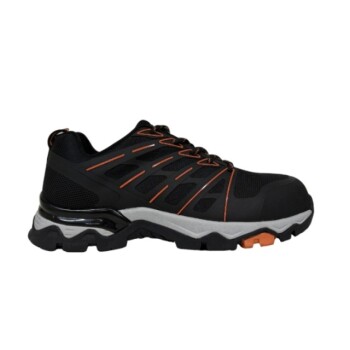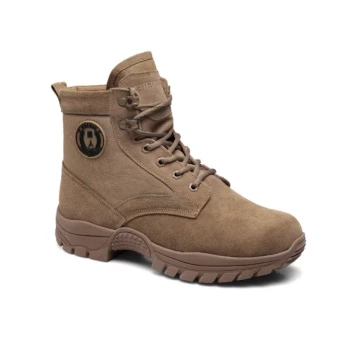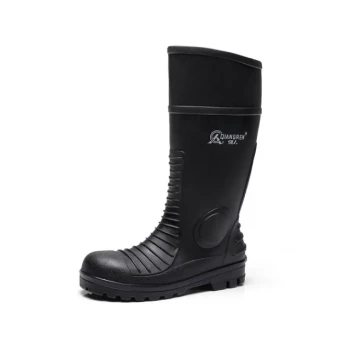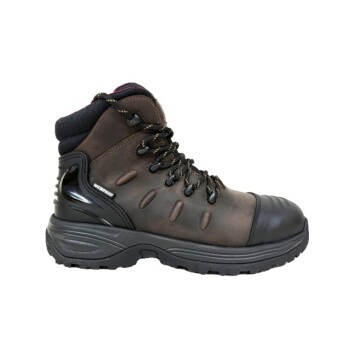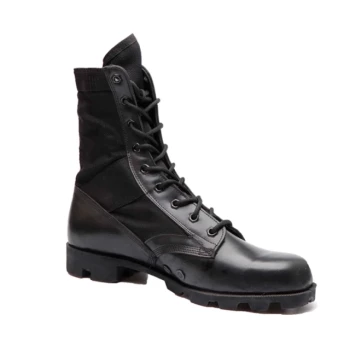Many professions consider slip-resistant shoes to be non-negotiable safety equipment. Workers in food service, healthcare, construction, and various industrial settings rely on them to prevent falls on hazardous surfaces. The core purpose of this footwear is to provide stable footing on floors that may be wet, greasy, or otherwise slick, directly mitigating a common and serious workplace risk.
The need for slip-resistant shoes is defined not by a job title, but by the work environment. Any role that exposes a worker to floors with water, oil, grease, or other liquids demands this specific type of protective footwear to prevent predictable and often severe injuries.
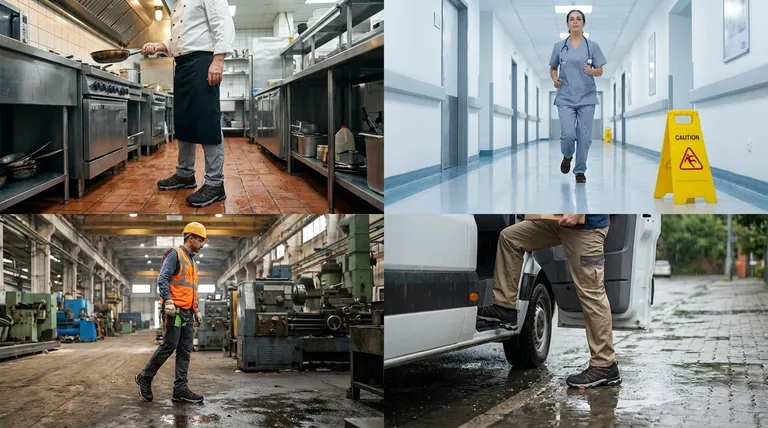
The Environments Driving the Need
Understanding the specific hazards of different workplaces clarifies why certain roles require this protection. The common thread is the regular presence of low-traction surfaces.
Food Service and Hospitality
Kitchens, bars, and restaurant floors are frequently contaminated with water, grease, cleaning solutions, and dropped food. The fast-paced nature of this work means staff rarely have time to check every step, making reliable footwear essential.
Healthcare and Medical Settings
Hospitals and clinics prioritize sanitation, leading to constantly mopped and polished floors. The potential for spills of bodily fluids or other liquids creates an unpredictable and slick environment where staff must move quickly and safely.
Industrial and Manufacturing
Factory, warehouse, and construction sites often have floors coated with oils, lubricants, dust, or water. Workers in these areas, including factory staff, linemen, and construction crews, face significant slip hazards on concrete and metal surfaces.
Logistics and Field Services
Parcel service workers and utility crews encounter a wide variety of surfaces in all weather conditions. They must navigate wet pavement, icy patches, mud, and uneven terrain, where a loss of footing can easily lead to injury.
The Real-World Impact of Slips and Falls
The requirement for slip-resistant shoes is backed by substantial data on workplace injuries. It is a proven and effective safety control measure.
A Leading Cause of Injury
According to the CDC, slips, trips, and falls are the third most common cause of non-fatal, work-related injuries in the United States. They represent a significant and preventable category of harm.
Beyond Individual Safety
For an employer, these incidents lead to increased workers' compensation claims, lost productivity, and potential regulatory fines. Investing in proper footwear is a direct investment in operational stability and employee well-being.
A Critical Factor for Vulnerable Workers
Older workers are often more susceptible to falls and are at a higher risk of suffering a severe injury from one. For this demographic, slip-resistant shoes are an especially critical layer of protection.
Making the Right Choice for Your Goal
Selecting the appropriate shoe depends entirely on the primary hazards of your specific role.
- If your primary focus is a fast-paced indoor environment (e.g., kitchens, hospitals): Prioritize shoes with soft rubber soles and dense tread patterns designed for flat, wet, and greasy surfaces.
- If your primary focus is industrial or construction work: Seek slip-resistant features combined with other safety elements like a protective toe cap and puncture-resistant soles.
- If your primary focus is outdoor or delivery services: Choose durable, weather-resistant shoes with deep, wide lugs that provide traction on uneven terrain, water, and mud.
Ultimately, selecting the correct footwear is a foundational step in proactive workplace safety management.
Summary Table:
| Profession | Key Hazards | Recommended Shoe Features |
|---|---|---|
| Food Service & Hospitality | Water, grease, cleaning solutions | Soft rubber soles, dense tread patterns |
| Healthcare & Medical | Wet, polished floors, fluid spills | Slip-resistant, comfortable for long shifts |
| Industrial & Manufacturing | Oils, lubricants, dust, water | Slip-resistant with safety toe, puncture-resistant sole |
| Logistics & Field Services | Wet pavement, mud, uneven terrain | Durable, deep lugs, weather-resistant |
Equip your team with reliable, high-quality safety footwear from 3515. As a large-scale manufacturer, we produce a comprehensive range of slip-resistant shoes and boots for distributors, brand owners, and bulk clients. Our footwear is designed to meet the specific demands of your industry, ensuring worker safety and reducing workplace injuries. Contact us today to discuss your needs and request a quote.
Visual Guide
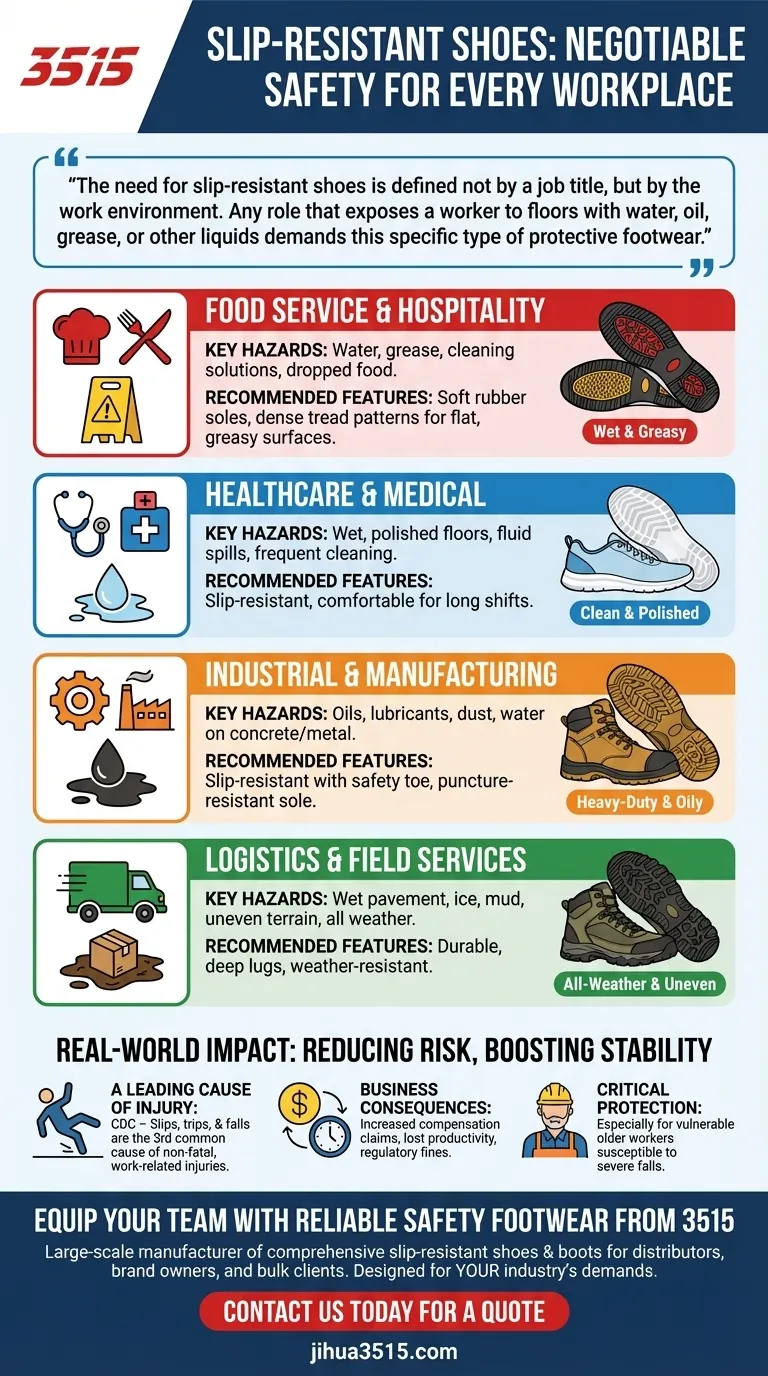
Related Products
- Premium KPU Injection Athletic Style Safety Shoes
- Wholesale Anti-Smash & Puncture-Proof Safety Shoes Custom Manufacturing for Brands
- Customizable Anti-Smash Safety Boots for Wholesale & Private Label Manufacturing
- Premium Wholesale Waterproof Safety Boots High Performance Protection for Industrial Markets
- Premium High-Cut Waterproof Safety Boots Manufacturing & Wholesale Solutions
People Also Ask
- What are the risks of not wearing slip-resistant shoes? Avoid Costly Injuries and Lost Productivity
- What are the key design considerations for high-friction anti-slip outsoles? Master Safety with Advanced Tread Science
- Why are slip-resistant shoes important in kitchen or restaurant environments? Prevent Slips and Falls
- How can footwear reduce slip, trip, and fall risks? Match Your Shoes to the Hazard
- What are the benefits of lightweight work shoes? Reduce Fatigue and Boost Productivity
- Why should someone wear slip resistant shoes? Prevent Costly Workplace Injuries
- Why are clogs suitable for healthcare and culinary professionals? Unlock Superior Safety & Comfort
- What is the cost-benefit analysis of investing in quality slip resistant shoes? A Smart Investment for Safety & Savings
